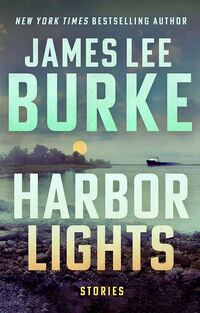Harbor Lights by James Lee Burke
 Friday, January 26, 2024 at 9:04AM
Friday, January 26, 2024 at 9:04AM 
Published by Atlantic Monthly Press on January 23, 2024
The stories in Harbor Lights feature people who have been in prison and people who might end up in prison. Some are drifters, others are professionals. Some live in solitude, others share their life with a child. Most have experienced a significant loss. Some have given up on life, others are still trying to figure it out. They are all from the deep South although some have migrated to the West. Nearly all the protagonists try (not always successfully) to cling to their moral center. Collateral characters are often racists and white trash who never had a moral center. A few characters are ghosts.
Three stories feature Burke’s recurring character and alter-ego, Aaron Holland Broussard. “Deportees” tells a story of Aaron’s grandfather as he stands up to southern hatred of Mexicans and Japanese-Americans during World War II.
The title story is told from Aaron’s perspective as the son of a man who defied the FBI by telling the press about his sighting of a German submarine while fishing off the coast of Louisiana. In retaliation, the FBI arrested the woman with whom Aaron’s father was having an affair, accusing her of being a communist spy. The story is about the ugly truth a boy learns about his father and the far uglier truth he learns about the country in which he lives.
The melancholy that pervades the novella “Strange Cargo” is almost overpowering. Aaron may have symptoms of cancer that he refuses to let his doctor diagnose because (in the doctor’s view) Aaron believes he deserves to die. All the things he loves are in the past. Following Holland family tradition, Aaron stands up to a tobacco chewing sheriff who is known for his racism, antisemitism, homophobia, and vindictiveness. The sheriff is haunted by the ghost of a slave just as Aaron is haunted by the ghost of his daughter. Aaron also sees spirits of slave chasers and their victims. If this were a different kind of story, the supernatural might threaten to get in the way. Since the story is ultimately a contemplation of death — its many causes and its effects on others — the supernatural makes a fitting contribution. It is also an exploration of southern hypocrisy, which Aaron comes to understand as an inevitability, even in his own life. The story requires Aaron to confront his family’s past (as well as his own) and, in doing so, addresses issues that arise in Another Kind of Eden and Every Cloak Rolled in Blood.
In “The Assault,” the police take little interest in investigating a beating that a couple inflicted on a professor’s (admittedly drunken) teenage daughter. The helplessness he has felt since his wife died in a car accident for which he blames himself is amplified by the assault, contributing to his sense of failure as a husband and father. While he is fishing with a Black professor, he has an encounter with racist rednecks. The police are more interested in the professor’s response to abuse than they are in the abuse inflicted upon the professor's daughter. A series of confrontations escalate from threats to violence. This is one of Burke’s most intense stories and my favorite in the volume.
“Going Across Jordan” tells the story of two drifters who ride the rails and enjoy a special kind of freedom. The older man irritates the authorities by singing Woody Guthrie songs. While working on a ranch in Wyoming, the younger man makes a foolish decision to accept his boss’ offer to borrow his Cadillac to bring a pretty Black girl back to the ranch. The young man learns that people with power who do favors for the powerless always have an ulterior motive. He also learns something about love and about achieving justice without resorting to violence.
I did not dislike any story in the collection, although three stories I liked a bit less. “A Distant War” is a story that would be at home in the Twilight Zone. A veteran whose radiator hose breaks brings his half Vietnamese son into the wrong bar (and maybe the wrong dimension) where he meets the wrong people at the wrong time. “Big Midnight Special” is a story about fighting and country music told in the setting of a prison. A seismologist who works in the oil drilling industry sleeps with the wrong married woman before all hell breaks loose in “The Wild Side of Life.”
Every story in this collection provokes thought. A reader might easily choose any of them as a favorite. All are told in a prose style that elevates grittiness to elegance in a way that only James Lee Burke can. This collection is a must for his fans.
RECOMMENDED
Reader Comments